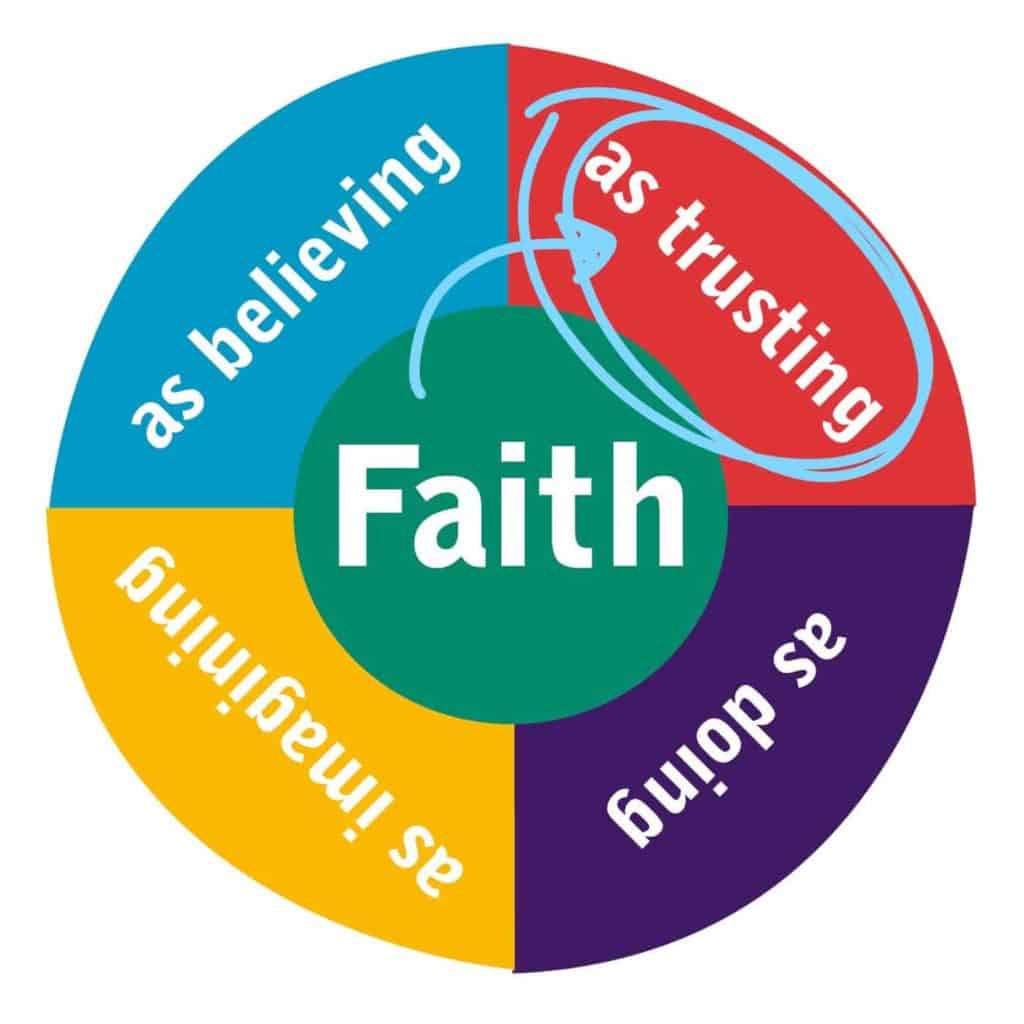
Our family recently went on a two-month Camping Adventure. My husband had a contract which meant either a four-hour commute or staying away, so instead, we all went and camped nearby. A few weeks in, we visited my parents with clothes to wash, devices to charge, and jobs to do using their wifi. It never occurred to me that they would say no. I knew they would welcome us with open arms (and a warm shower), and that they would let us use their clean towels and washing machine before sending us off to continue on our adventure.
I was writing this article during our visit, and I realised that a trusting relationship with parents is a lot like trusting in God. My experience with my parents has given me complete confidence in their love and care for me. This also makes it easy for me to trust God – to know He cares and provides for me, that He will do what He says He will do – to trust Him.
In the book Children Finding Faith, Francis Bridger describes faith as believing, trusting, doing and imagining. In my last three articles, I’ve explored believing, doing and imagining, and how we can nurture these aspects of faith at home. Faith as trusting is in some ways the most obvious part of our faith, but we shouldn’t overlook it as we seek to nurture faith at home.
Have you ever played a game where you place everyday items inside a box or bag and try to guess what they are? Even if you can tell what the item is, it’s impossible to know the details about it, such as what colour is it. This is a bit what faith is like. We know God, and we know what He’s like, but we don’t always know the details which we’d like to! We often find ourselves in situations where we have to hold our knowledge and previous experience of a good God who cares for and provides for us with our current situation which doesn’t seem to quite match up.
I like ‘pause’ in the middle of Bible stories and wonder what the people might have felt. Imagine Abraham travelling with his family after God tells him to leave and go without telling him where. Years later, he arrives in the land, it’s full of other people, and Abraham still has no children to become ‘a great nation’. I wonder what he felt. I wonder if he asked God what was going on. Did he doubt if he’d heard God correctly? He could easily have given up. Instead, the Bible says that he built an altar, worshipped God and that God came and repeated His promises to him, in effect saying, “Trust me. I will do what I said I’d do.” And Abraham trusted God, earning his place in the Hebrews 11 Faith Hall of Fame. This is faith as trusting.
The ability to trust is something which develops very early in life. As babies, we instinctively ((spiritually?) develop trust in the adults who care for us as we experience their consistent provision and affection. Bridger says, “The foundations of faith are being laid even at this early stage. A child who does not learn how to trust adults now will have difficulty trusting anybody at more than a superficial level later on.” This sad fact is displayed by children, such as cared for children, who’s trust has either been broken or never developed and so have shaken foundations on which to build their future relationships. (Recent research by Care for the Family showed one of the big factors as to whether children grow up as people of faith is the warmth of their family relationships.)
Looking at this from another perspective, it gives meaning and purpose to the repetitive activities which fill the days of parents of young children – the feeding and changing and helping their child sleep are actually growing faith. And parents of older children can also be encouraged that our seemingly never-ending parental activities (getting meals, cleaning clothes, doing bedtime) as well as being (mostly) consistent with what we do and say are all contributing to our children’s understanding and experience of a God who can be trusted.
It is also important for children to know that others trust them. This is harder for many of us. In her book Children’s Spirituality, Rebecca Nye talks about trust as one of her six things which helps develop children’s spiritual life. To allow our children to grow in their relationship with God, we need to trust them and trust God. We need to trust that God is at work in them, that He will communicate directly with them, that the Holy Spirit will lead them. Often we display our lack of trust by exhibiting excessive control, for example by:
- deciding what spiritual lesson they should be learning rather than encouraging them to let God guide them
- choosing what message they should get from a certain Bible passage instead of engaging in wondering to help them discover for themselves
- allocating the practical application rather than inviting them to ask God.
Part of this is also respecting children’s privacy and letting them respond to God without asking what they are doing or saying. If we believe that they can relate to God, we must show that!
Helping children develop their trust in God can be as simple as being real about the difficulties we face, asking them to join us in asking God for help and chatting about what happens next. It’s also good to share stories about what God has done and situations when it was hard to see what God was doing, as they help children connect their knowledge and experience of God, and therefore trust of Him. Sharing these stories is part of our faith heritage. The biggest examples are probably the annual Passover meal to remember God bringing the Israelites out from being slaves in Egypt, which ties into our communion meal. Before both of these events, God said what He would do AND gave His people a way to remember what had not yet happened. One of the things I love about is that it shows how God knows us – He knows our need to remember what He has said and done, and He knows that when we remember His past faithfulness, it increases our faith and helps us trust Him today.
What could you do in your family to increase the amount of storytelling about what God has said and done? Could you add a short storytelling into celebrations such as birthdays or Easter? Could you make a photo album or short video to help you share those stories together? Could you ask one of your children to share a story of their own? Could you look for Bible stories to explore together to discover the God who does what He says?
